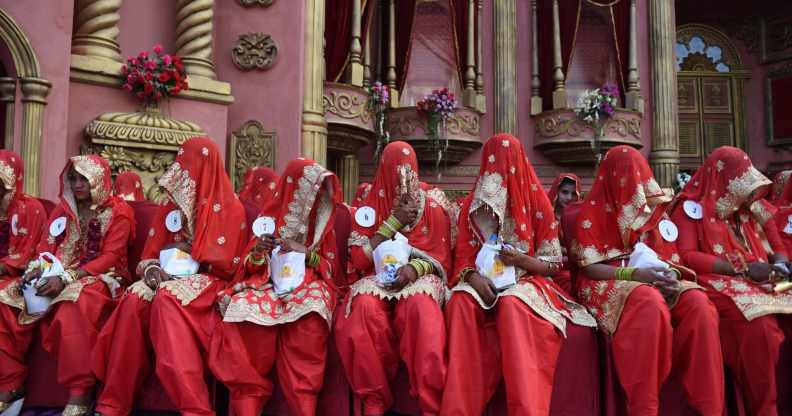Indian marriage site Shaadi.com to start matchmaking LGBT+ couples – despite same-sex wedding ban

Indian brides (SAM PANTHAKY/AFP via Getty Images)
Shaadi.com, one of India’s most popular websites for singles seeking marriage, has announced that it intends to open up its services to the LGBT+ community.
The company’s founder and CEO, Anupam Mittal, made the announcement in an interview with Business Insider. The decision comes four years after same-sex relationships were decriminalised by the Indian Supreme Court.
“We see ourselves as a platform for companionship and matchmaking… That could mean for different markets, different regions, different countries, different sexes,” Mittal said.
“We don’t have a problem with that. But we will significantly expand the kind of things that we do from a matchmaking context.”
The move forms part of the company’s intentions to expand their services. It will also be launching two new products, the details of which Shaadi.com has yet to divulge.
The casual dating industry has continued to boom, with its revenue expected to reach $1467m this year. Despite this, Shaadi.com continues to set its sights on marriage.
“Anything we do, we have to do with serious dating, finding a companion or finding a life partner,” Mittal asserted. “Not for finding a date tonight or finding the right partner. That’s not a business we are in or we want to be in.”
Although the move signifies an attempt to integrate the queer community into wider Indian cultural norms, it has not come without resistance. Twitter users’ responses to the announcement have varied.
When did same-sex marriages got legalised in India? Or are we expecting a favourable verdict from the courts?
— Mandar M (@Watsay) December 18, 2021
Some have pointed out that Shaadi.com’s intention of expansion could signal the potential for the legalisation of same-sex marriage in the country, given that the company markets itself as a “matrimonial site”.
Others have taken a more cynical approach, stating that the announcement is meaningless and that unless the company supports legalisation, the potential for change is stunted. Currently, there are six separate cases in the country of couples petitioning for the right to marry.

